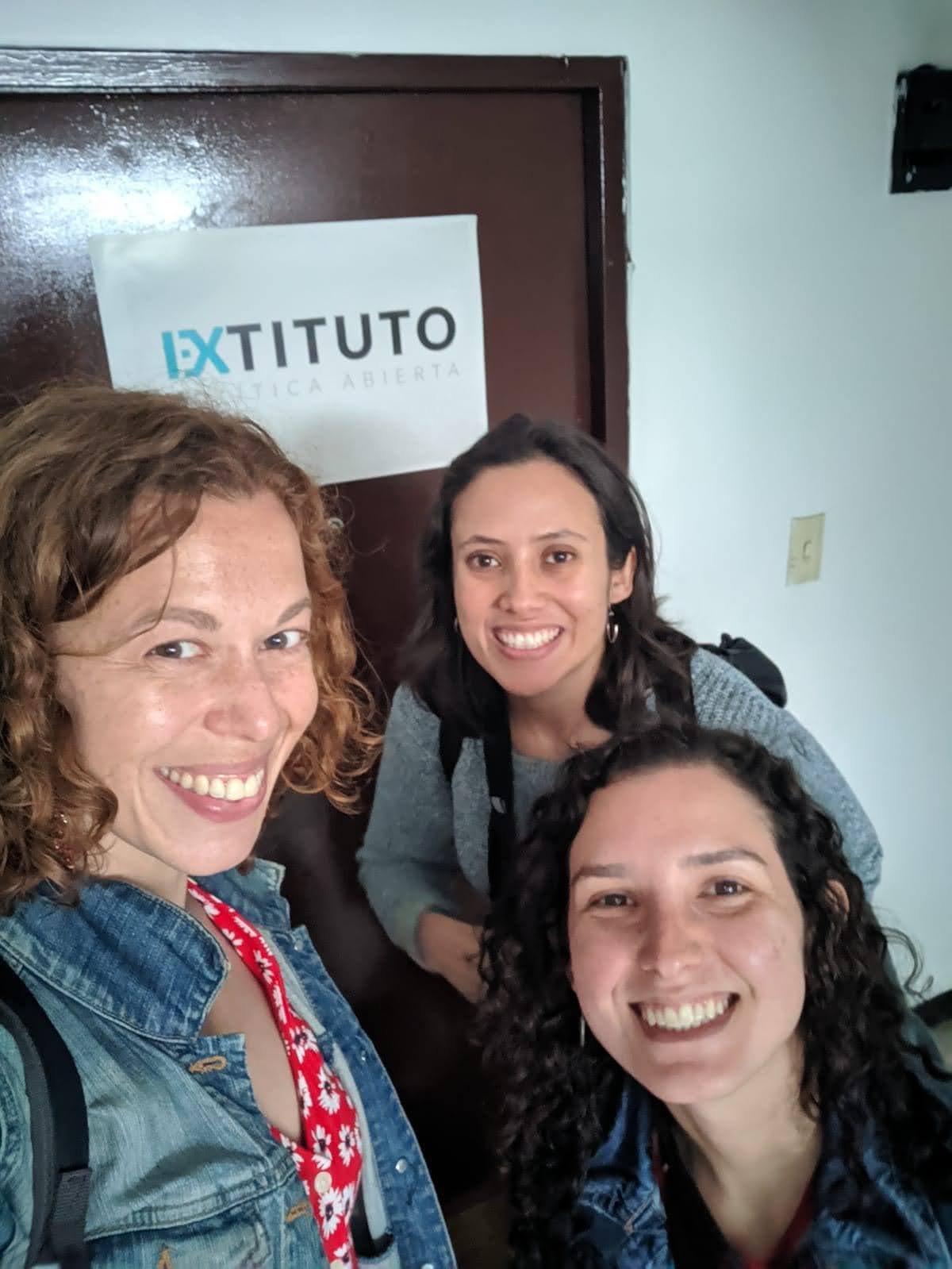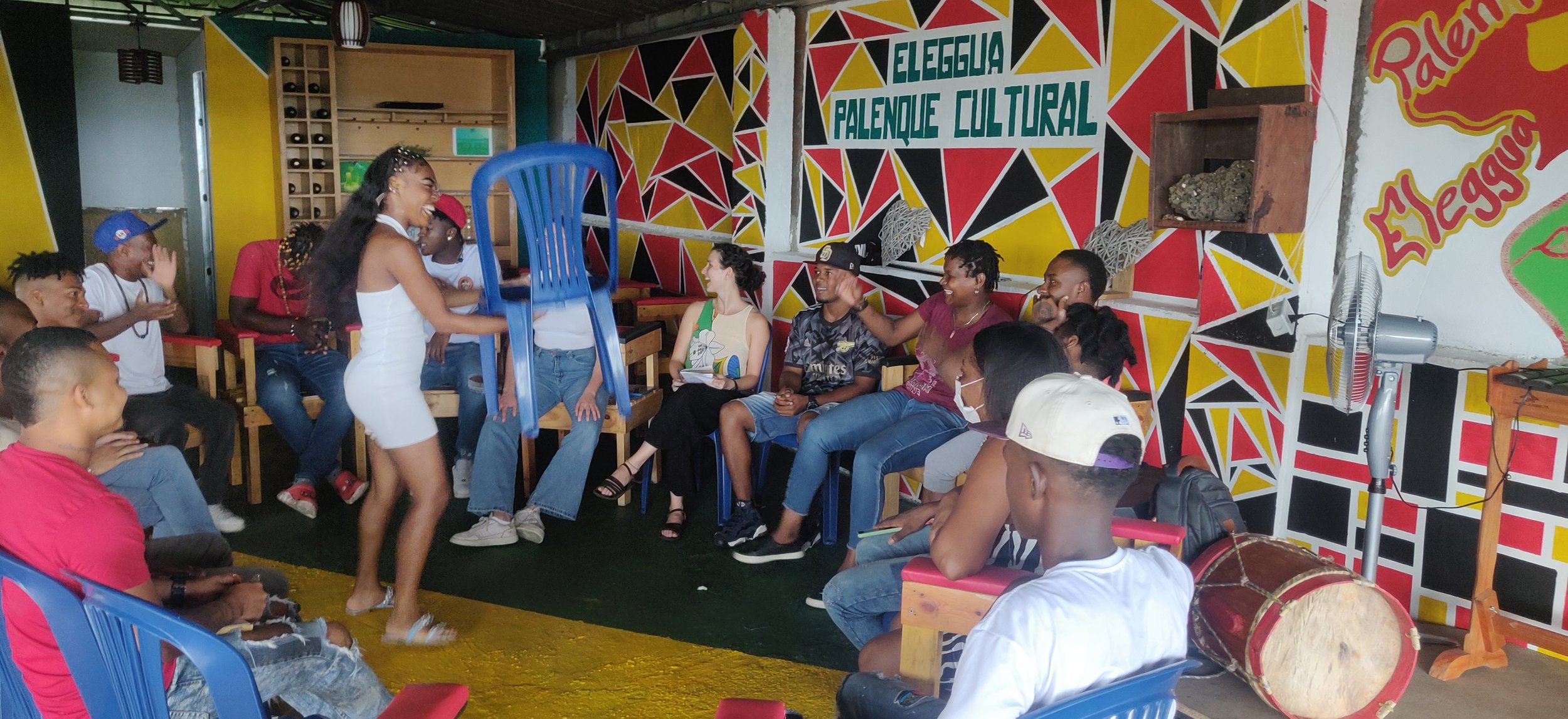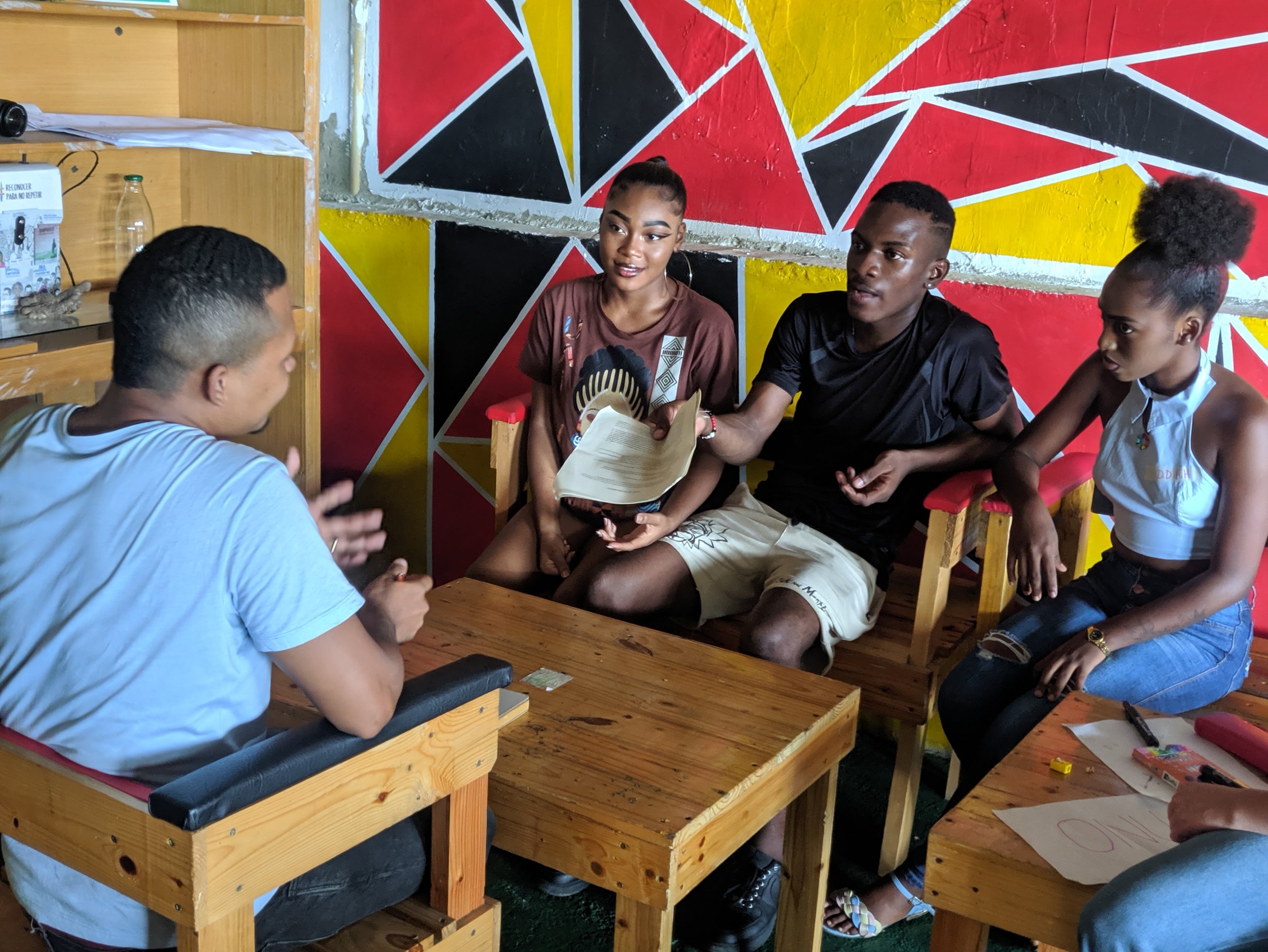Rebuilding trust in democracy, and in each other
/A report-back from a Demo:Reset residency in Buenaventura, Colombia
By Fernanda Menin, Katy Rubin and Aluna Serrano
From left: Katy, Aluna and Fernanda
In Spring 2023, three participatory democracy practitioners – Aluna Serrano, Fernanda Asseff Menin and Katy Rubin – set out to co-design and prototype a project that asked the question: How can participatory processes, such as legislative theater, help rebuild trust in situations of socio-environmental conflict? Along the way, we learned more about trust than we expected: trust in a playful approach to serious issues, trust in each other, even trust in new-to-us modes of transportation!
The Democracy Residencies in which we participated were a collaboration between Extituto de Política Abierta – as part of its Demo.Reset program, designed to build collective knowledge on deliberative democracy across the Global South – and People Powered, whose members voted to initiate in-person practical exchanges. This residency was first designed in a Demo.Reset exchange in Bogotá in autumn 2022. Fernanda, who works with Politize! in Brazil, and Aluna, who works with Extituto, were both part of the Bogotá convening. When Katy came on board in early 2023 to contribute her legislative theater experience, we had to work quickly in the face of various challenges, while also getting to know each other and wrapping our minds around the project.
This residency was unique in that we didn’t have a confirmed community partner that fit the design and boundaries of the prototype at the start. It took some time to connect with a group, but we were finally connected with leaders in Buenaventura, Colombia (a port city on the Pacific coast). The city has a strong tradition of political engagement, while also grappling with challenges such as access to safe drinking water and public safety. We were charged with working with community members who were experiencing a breakdown of trust in the midst of these socio-environmental issues. Legislative theater was chosen as the participatory democracy tool to use, in the hope that storytelling, fun and creativity could diffuse some of the tension and engage people who had lost faith in political change.
After several months of online meetings, we met in Colombia on May 12 to kick off a few weeks of in-person collaboration. Here’s an account of our first week together:
Day 1: Finally, face-to-face!
Aluna and Katy landed in Bogotá following the People Powered convening in Mexico City, while Fernanda had already arrived several weeks before to work remotely, get to know the city and practice speaking Spanish. The residency team had a delicious lunch of noodles and tamales, followed by a long planning meeting at the Extituto office, hearing from other colleagues who have experience working in Buenaventura. In the evening, we went to watch some experimental, clown-based theater at a local venue called R101.
Day 2: Trust is a long and windy road
Early in the morning we took a flight from Bogotá to the city of Cali, followed by a four-hour bus ride – really, a van – up and down and around the mountains that run between Cali and Buenaventura. Although Buenaventura is the biggest port city of Colombia, with major export and import activities, there’s only one road in and out of the city. It's frequently closed due to landslides or protests, and there's no train, although apparently changing that is a commitment of the current government. Therefore, trucks, buses and vans all need to take this road to enter or leave, and it's slow, as well as steep!
Day 3: Prep on the beach
On Sunday, we took a motorboat to see a nearby beach, and spent many hours planning our first workshop for the following day. The boat ride back to Buenaventura was rocky – the beginning of our ongoing jokes about trust in modes of transportation: vans, boats, taxis and tiny planes too!
Day 4: This is not a chair!
We had our first session with an incredible, community-based cultural center led by a local organizer, Leonard. His center, called Eleggua: Palenque Cultural, works with Extituto on participatory initiatives in the city, including a radio program that helps engage residents in local planning efforts. They gathered a group of 15: mostly young adults and mostly men (just three women). This group worked with us all week.
A group photo!
The first session was all about building community, having fun, and using games and exercises from the legislative theater and Theatre of the Oppressed toolboxes to identify local challenges relating to lack of trust stemming from socio-environmental conflict.
We talked through our goals, made group agreements, and played a game that got us talking about rules, laws and structures that cause harm. Another game, in which we transformed a chair into dozens of other objects, led us to a dialogue on the power of collective imagination to change those rules.
A game in which a chair was transformed into other objects, leading to a dialogue on the power of collective imagination.
Finally, we produced a short scene, in which all the participants were invited to replace the main characters and try new ideas to achieve a goal, illustrated how theater can be used to generate and test creative solutions to entrenched problems.
Making sculptures with our bodies
After a snack of arepas with cheese, we made sculptures with our bodies to reflect on institutions and gatekeepers that people encounter in their daily lives in the city. We ended with a deep dive into the various ways the Alcaldía (local government) of Buenaventura ignores the needs of residents and their inquiries or protests. Essentially, it was a multitude of expressions of broken trust.
We faced various challenges: It wasn’t easy for the group to commit hours to this process every day, around work and studies. In addition, the extreme heat drained everyone, and then a sudden rain was so heavy we couldn’t hear each other speak. Meanwhile, Fernanda and Katy stumbled sometimes in Spanish during the discussions! Luckily, Aluna and the group kept us on point. At the end of this first day, we felt energized about the residency and hopeful that we’d successfully test legislative theater as a way to joyfully and creatively generate proposals for action.
Day 5: A day off
Palenque Eleggua had a different event planned, so we had a day off. We spent the first part of the day catching up on other work, and then after strong Colombian coffee and a local lunch of rice, beans, plátanos and fried fish, we spent three hours planning for Wednesday’s session. A highlight of the residency was the opportunity to share facilitation responsibilities and teach each other games and exercises from the legislative theater toolbox. After we made the plan for the day, we got on our feet and practiced the instructions, because at the end of the week, Katy would have to leave, while Fernanda and Aluna were going to lead another group through a similar process.
Day 6: It’s heating up
It was so hot: nearly 100 degrees Fahrenheit, or 36 degrees Celsius, and our workshop space was outdoors, with a roof but no walls. Despite the heat, nearly everyone from the group came back on the second day. We started with a rhythm game called Mosquito, which involves just a bit of movement but was really too sweaty for 100 degrees. Our main goal for the day was to identify the real-life stories of socio-environmental conflict and breakdown of trust between residents and local government to develop them into scenes — that is, frames through which the community articulates the policy problem in a human context.
We also started to get more specific about local challenges around water. These included access to potable water; sewage and removal of wastewater, as there is no functional aqueduct for the valley; and safety and security issues around the port.
We were now ready to form two groups: The first play addressed the breakdown of trust with the newly elected mayor, who promised change but then refused to engage with residents, staying locked inside his office, and reacting with violence when residents came to legally and peacefully protest outside the municipal offices. The other play told the story of a family who don't have any water for days and have to go to another neighborhood with a bucket. But when they do, they must cross the "invisible borders” of the two major drug-related gangs in the city. At the end, one gang’s leader seeks out the family to threaten them in their home. Meanwhile, the police are afraid of the gangs; in the scene, an officer sits in the street, ignoring the situation.
After performing a rough draft of each scene, the groups continued to uncover more of the sociopolitical context. The first group "zoomed out" to add additional characters who have influence over the situation but were not present for the action, revealing more complexity but also opening up more avenues to potential policy change. The other group did an "interrogation," in which the audience members ask difficult questions of the characters to get them to speak aloud about their inner prejudices and beliefs. At that point, we were ready to return the next day for a mini legislative theater process!
Day 7: The joy of voting
On our last day at Palenque Eleggua, it was very hot once again. There had been a shooting in the local community the night before. The energy was low, and we weren't sure how far we'd get with the day's plans. It didn't make sense to force things, and that's not how we work.
Participants improvising in pairs
So, we started gently with an improvisational game in pairs, preparing the participants for the idea testing phase of a legislative theater process. Everyone laughed a lot at the opportunity to invent escalating accusations, and the energy started to shift.
We were ready to move into the performance, to generate creative policy ideas. The group really got into the flow of the forum, in which audience members improvise and test new ideas onstage; after each improvisation, the conversation was heated about whether and how each idea could possibly work in Buenaventura.
With only 45 minutes left, we weren't sure if energy remained for proposal-writing and voting, but we gave it a try.
So many powerful and specific ideas emerged! We held a vote, sitting in a circle, with red and green voting cards; until the last minute, the group deliberated. It was a surprising end to a day that had a difficult start, and a reminder for us that the opportunity to shape rules and policies, even in a "mock" session like this one, is a source of energy in itself.
That night, we reflected on trust. We wanted to think about trust more expansively than the relationship between residents and governments; it is also about the relationship between neighbors, and between citizens and community leaders. Can trust only be rebuilt when all the parties truly understand the human impact of a public problem? Perhaps joyfulness and fun are the secret ingredients to a trustworthy participatory process. We three had learned to trust each other as facilitators and collaborators so quickly, after meeting just a few months before; that was crucial to the success of our residency.
We’re left with plenty of questions, and energy to take this prototype forward. Can the legislative theater methodology continue to be useful in Buenaventura? What will it take for the local government to sign on, and for more residents to trust in the power of these tools?
Postscript
Over the following two weeks in Buenaventura, Fernanda and Aluna replicated this rapid legislative theater prototype with a different group of youth and adult activists, who had their own take on the problems of access to clean water, and generated a new set of proposals for local and national public policy. We were heartened by the enthusiastic response to the methodology as well as the new tools that the residency team would be bringing back to their respective organizations: legislative theater initiatives could start popping up wherever Extituto and Politize! work with communities in the near future.
Stay tuned for more updates from our powerhouse residency team!









